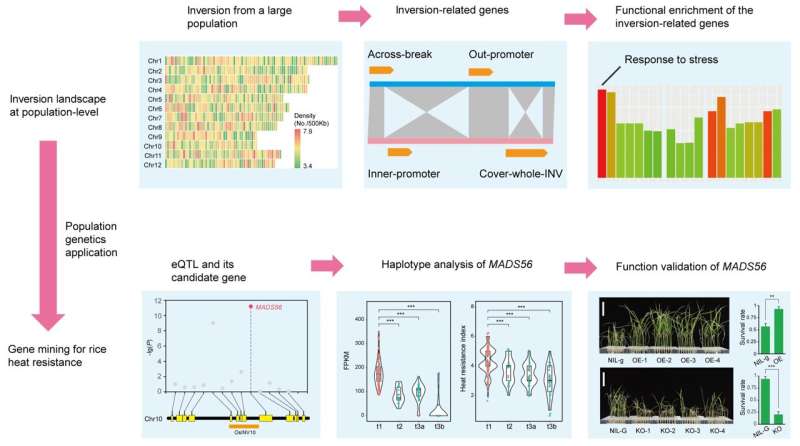This article has been reviewed according to Science X's editorial process and policies. Editors have highlighted the following attributes while ensuring the content's credibility:
fact-checked
trusted source
proofread
Widespread inversions shape the genetic and phenotypic diversity in rice

A new study titled "Widespread inversions shape the genetic and phenotypic diversity in rice" and published in Science Bulletin has been led by Prof. Lianguang Shang (Agricultural Genomics Institute at Shenzhen, Chinese Academy of Agricultural Sciences), Prof. Qian Qian (Yazhouwan National Laboratory), and Prof. Shaokui Wang (State Key Laboratory for Conservation and Utilization of Subtropical Agro-Bioresources, South China Agricultural University).
Rice is one of the most important food crops in the world, and the continuous improvement of rice varieties is due to the utilization and mining of germplasm resources, especially the mining and utilization of elite genes. The rich genetic diversity of global rice germplasm resources provides an important basis for the genetic improvement of rice favorable traits. Therefore, it is of great significance for rice breeding and improvement to continuously promote the elucidation of rice population genome diversity and in-depth exploration of rice's excellent natural variation.
As a classical molecular tool, traditional simple variants such as single nucleotide polymorphism (SNP) in the rice genome have been widely used in the field of rice population genetics for more than 10 years, and there is an urgent need to develop new genetic resources, which gradually draws attention to the application of population genetics to complex structural variants.
Inversion is a kind of complex structural variation in genome. This study applied PacBio or Nanopore genomic sequencing data of 377 cultivated and wild rice accessions in global to construct a large-scale map of genomic inversion variation, which is the largest inversion dataset at the population-level in rice to date.
The effects of inversion variation on gene structure and function were analyzed through the whole genome, revealing that the genes related to stress response were obviously enriched within or near the inversions, which revealed the important influence of inversion variation on rice stress resistance.
Combined with transcriptome data of a super pan-genome population, eQTL analysis of inversion variation was carried out and identified 863 genomic inversion sites related to expression level variation of 4722 genes. One local eQTL, OsINV10, which significantly affected the expression level of MADS56, was studied in detail. One breakpoint of OsINV10 was also located in the promoter region of MADS56 gene. Functional analysis and haplotype analysis indicated that this gene may be related to heat resistance of rice.
Heat tolerance analyses on overexpression and knockout mutants both confirmed that this gene can positively regulate and enhance the rice heat resistance. After population frequency evaluation, it was found that the inversion genotype was distributed in 74.8% of the indica rice population and 6.0% of the japonica rice population, which may be an important source of heat resistance differentiation between indica and japonica rice.
This study summarized the functional variation patterns of genomic inversion in rice populations, confirmed the important role of inversion in functional gene expression and phenotypic variation of rice, and provided an important basis and research model for fully exploiting the genetic potential of rice inversions and its further application in modern rice breeding.
More information: Wenchuang He et al, Widespread inversions shape the genetic and phenotypic diversity in rice, Science Bulletin (2023). DOI: 10.1016/j.scib.2023.12.048
Provided by Science China Press





















